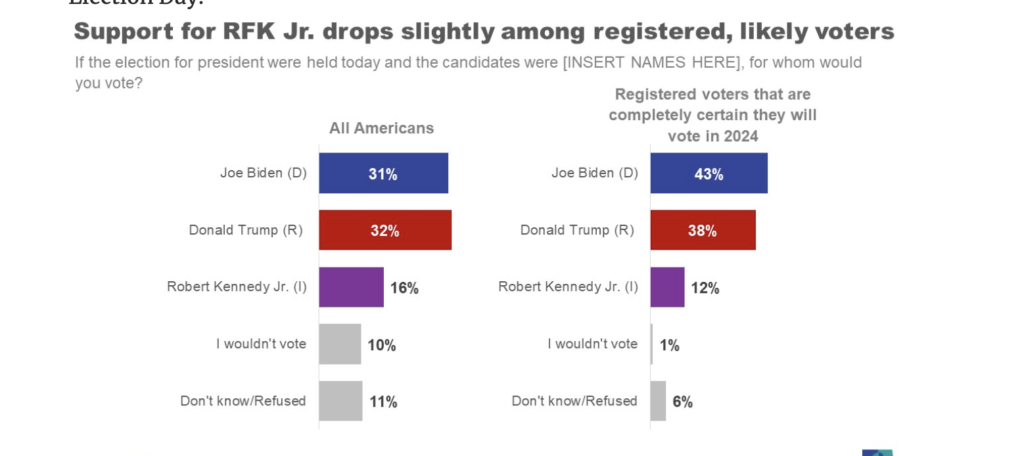History of Third Party Candidates
Have you ever wondered about why there has not been a Third Party President in recent history, or even since 1856 when the Republican Party became the second major political party. While there have been many notable runs in presidential elections from thirty party candidates such George C. Wallace, John B. Anderson, and Ross Perot, Wallace in 1968 was the last candidate to receive any electoral votes and win a state as an independent candidate. The voting and campaign structure in the Presidential election strongly stacks the odds against third party candidates for many reasons such as high costs, struggles for ballot access, the strategic voting theory, and the plurality voting system. In this year’s 2024 Presidential election, Robert F. Kennedy Jr. is running as an Independent Candidate. While he likely will not win the election, he is receiving enough votes to spoil the election and cause an impact on the outcome between President Joe Biden and Former President Donald Trump. As Robert F. Kennedy Jr. continues to gain publicity and support across the country, how will his presence in this year’s election impact the overall outcome?

While Third party candidates from Libertarian, Green or independent rarely win electoral votes, they very much influence swing states and can take voters away from Democratic and Republican parties. Looking into the history of third party candidates, first off, George C. Wallace, who ran as an independent candidate in the 1968 election. His whole goal was to get enough votes to send the election results to the House of Representatives. While he ended up third in electoral votes, he received five states and 13.5 percent of the popular votes which definitely had an impact on the final outcome of Richard Nixon ultimately winning. Next, Ross Perot who ran in the 1992 presidential election as an independent candidate. While Perot ran alongside two historic politicians George H.W. Bush and Bill Clinton, he received around 19 percent of the popular vote and is viewed as one of the most successful independent candidates of all times. Perot also brought on strong policies revolving around federal deficit and debt that influenced the way we look at this topic today. Finally, John B. Anderson, who ran as an independent candidate in the 1980 presidential election was a strong Republican candidate that at the last minute changed to independent. Anderson, who also ran alongside historic politicians Jimmy Carter and Ronald Reagan, started off very strong but his change in public opinion over topics revolving around supporting abortion and involvement with the oil crisis lost him lots of voters. While all three of these politicians fell short in the elections, their presence in the elections spoiled lots of electoral votes for major parties and brought on lots of new ideas and policies which had a major impact on society. It is clear that while we may never see another third party present, their involvement in the voting and election process definitely has had a major importance.
Looking into the 2024 presidential election, while it is extremely unlikely that Robert F. Kennedy jr. wins the presidential election, it is now clear that his involvement can be very important and possibly spoil the result between Current President Joe Biden and Former President Donald Trump. He said this himself in a rally; “My intention is to spoil it for both of them.” Leading up to Kennedy’s decision to change from a democratic candidate to an independent, Kennedy was criticized by democrats for his comments about the vaccine, where he was labeled an anti-vaxxer. While Kennedy denied this and clarified his intention of advocating for vaccine safety, he lost a lot of democratic support. In hopes to regain support, he claimed that his beliefs relate strongly to the rest of the democratic Kennedy family beliefs such as healthcare reform, strong middle class and racial justice. So, while Kennedy brings a slightly different side of Democratic beliefs to his independent campaign, he has support from both parties and roughly carries around 10-16 percent of the voters’ popularity.

https://www.ipsos.com/en-us/whos-voting-robert-kennedy-jr
While it is clear that Robert F. Kennedy likely won’t win the election, he brings lots of important ideas and policies that have the potential to possibly spoil the 2024 presidential election. As seen in the history of third party candidates like Kennedy, they can be very influential and can be credited to lots of policies and ideas that we still hold today. So, it is very important that third party candidates have a fair opportunity to run in elections. While they likely won’t win the election, they will bring a whole different view of policies and ideas and can possibly change the course of history through their ability to change outcomes of elections.
Citations
Abramson, Paul R., John H. Aldrich, Phil Paolino, and David W. Rohde. “Third-Party and Independent Candidates in American Politics: Wallace, Anderson, and Perot.” Political Science Quarterly 110, no. 3 (1995): 349–67. https://doi.org/10.2307/2152568.
Britannica School, s.v. “Robert F. Kennedy, Jr.,” accessed May 17, 2024, https://school-eb-com.westminster.idm.oclc.org/levels/high/article/Robert-F-Kennedy-Jr/639108
Bauer, Addicen, and Molly Olmstead. “A Romp through History’s Most Successful
Third-Party Presidential Candidates.” Slate. Last modified July 3, 2023.
“Who’s Voting for Robert Kennedy Jr.?” Ipsos. Last modified March 22, 2024.
Accessed May 17, 2024. https://www.ipsos.com/en-us/
whos-voting-robert-kennedy-jr.
Houston

Comments are closed.